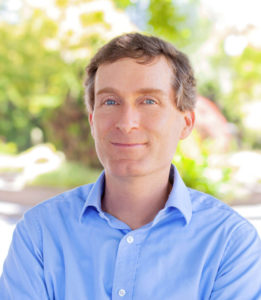As part of its ongoing examination of Arizona groundwater policy, Chamber Business News is visiting with water experts and policy leaders about their views on groundwater and what they believe are the defining issues for one of the state’s most pressing challenges.
Today CBN visits with Todd Reeve, CEO of the Bonneville Environmental Foundation and co-director of Business for Water Stewardship.

This interview has been edited for clarity and length.
Chamber Business News: Tell us about the Bonneville Environmental Foundation and Business for Water Stewardship.
Todd Reeve: BEF, the Bonneville Environmental Foundation, is a nonprofit organization that’s a parent organization for several core pillars of work. Perhaps the largest pillar of work is Business for Water Stewardship. Business for Water Stewardship is BEF’s platform where we collaborate with the private sector, with businesses, large and small, to help advocate for and reinforce proactive and progressive water solutions. The goal for Business of Water Stewardship is to understand private sector and business needs and help build out policies, projects, platforms that can help stretch the benefit of every drop of water to support environment, community, and business needs. We’re very committed to our business partners, but we also see water security as having enough water to support business, community, and environment.
CBN: It’s central to the premise of Business for Water Stewardship that your organization believes that private employers can improve Arizona’s water standing?
Todd: Absolutely–in really, really big ways. Obviously, they all can do a great job of conserving water in their operations and facilitating reuse and water efficiency, which is fantastic and really important. But I think the real potential is when we think about how Arizona has evolved from a very rural kind of pioneering, ranching, farming, mining state to a place where Fortune 50 businesses are increasingly locating and growing. Businesses are critically important. They are massive employers in the state, they’re bringing investment. And so business influence has the potential to influence policymakers, community members, stakeholders. So, just seeing businesses step up, build awareness around these issues and come to the table has unbelievable influence. I sincerely believe that activating business influence is one of the biggest levers that we can push on to advance positive water policy and action needed to achieve long term water security for Arizona.
CBN: One of the things that we’ve heard as part of these conversations with representatives from industry is the belief that development in and of itself doesn’t necessarily need to be a negative for Arizona’s water position. Would you agree with that position?
Todd: I do agree. And I think what we’re talking about is changing the narrative to say, if we do things right, we’ve got incredible promise and upside in the state of Arizona. This isn’t just a dire crisis and things are going to get worse from here. This is an opportunity to really shift the narrative and say, we’ve got the technology, we’ve got the capacity, we’ve got the vision. We can create the policy and practice to really support and grow business investment and maintain adequate water for environment and for communities.
I would have to mention that it can also go the wrong way. Presumably any business use of water, any development, can certainly lead to negative consequences around water, but I think development and business engagement on this is about recasting the narrative and doing it in the right way. And there are examples from Las Vegas and Israel and other places where people continue to do more with less. I think that’s what the opportunity is here.
CBN: There seems to be an emerging opinion that there might be a technological solution here, that there are other arid regions in the world that are figuring out how to still sustain agriculture in arid regions. Is that your experience?
Todd: Absolutely. I think we’re really at the tip of the iceberg in terms of turning the corner on better, wiser water use. There’s no question that technology and agriculture can provide unbelievable gains, and we’re seeing articles every day and analysis showing that there’s new technology that allows agriculture to do more with less water. In some areas of the state agriculture is already very efficient, however, there are still large gains to be made in many regions. It’s interesting to reflect on this and think about our pioneering heritage. Most of our irrigation systems were hand-dug by pioneers a century ago, and because water flows downhill and because water rights exist–if you have access to it, water can be relatively cheap. We really haven’t upgraded some of these systems in significant ways. I think that’s one of the signals we’re seeing–it’s really time to make those investments. Leverage federal funding for infrastructure, leverage state, federal private programs that can put money into long-term irrigation, modernization, and really shore up the ag sector for long-term profitability and success. I think that’s at the top of the list: How do we invest in and deploy technology and infrastructure to sustain agriculture, to sustain ranching and use less water?
CBN: You’re also saying that about the agricultural sector as well. We don’t necessarily have to get rid of agricultural or ignore Arizona’s agricultural legacy. We can do it, but we might need to do it in a different way.
Todd: I think that’s right. Agriculture has evolved in many ways over the last century, and you look at some of these basins in the West and they’ve shifted what types of crops they plant, they’ve shifted how they use water over time. I think we’re at that stage where we’ve been using water in a certain way for a certain type of crop and we really don’t want to change. But I think opportunities are just around the corner and the demographic shift that exists in ranching and farming—combined with the technology–I think we’re right on the cusp of making that shift. That’s where I think there’s incredible opportunity, and I’m optimistic both in the municipal, urban setting and in the ag setting that we will make that transition and will use water where it provides high value to rural communities and farming interests and be able to sustain our agricultural heritage.
CBN: Let’s say that you encounter a new legislator and they say, “Todd, I know I need to get smarter on this, but where do I start? What do I need to know? Or at least what sort of guidepost should I adhere to as I think about groundwater?”
Todd: Given the conversation in Arizona today, I would say it’s really important to understand that Arizona was a pioneer in groundwater management 40 years ago in a small portion of the state. As a result, about 20% of the state has rigorous, active management of groundwater, primarily some of the urban areas, particularly Phoenix and Tucson. And I think the most important thing to know is that outside of those areas, in roughly the remaining 80% of the state, groundwater is open access, unmanaged. And what has shifted is the demands for that groundwater have changed dramatically because there’s open access, there’s risk of overexploitation, there’s risk of outside parties that are better capitalized, drilling deeper, pumping more, undermining existing farmers and ranchers or ones that even were there a hundred plus years ago. So, for me, that’s a central issue right now: 80% of Arizona’s groundwater, mostly in rural areas is unprotected, unmanaged, and the tools don’t exist to allow local communities to create their own pathway to understand, manage, protect, ensure groundwater supply, whether it’s for businesses, small farms, large farms, period.
Number two from my perspective is this matters! Whether you’re a big business or your district is in Phoenix or Tucson, the overall perception of water management and water security in Arizona matters to everyone. Even if you’re in Phoenix and you feel that water is relatively well managed in your region and you’re protected, I don’t think we can afford to have articles in the New York Times and other national outlets every week saying that Arizona’s running out of water, because I see our business partners scrutinizing water risk—and public perception of risk IS water risk for businesses and companies. So, understanding that Arizona is comprised of an integrated water story is important, and it would be very advisable for us to be sure that we’re taking care of water in the rural areas in the same way that we’re taking care of water in the urban areas.
CBN: Is Arizona groundwater policy still doing its job or do we need to reimagine a whole new regime of groundwater policy?
Todd: I don’t think we need to reimagine a whole new regime, but I do think we need to reflect on fundamental changes that have occurred over the last 40 years. We anticipated that the Colorado River would be a reliable input of renewable water supply to the state that, in concert with groundwater, could be managed to sustain long term water availability. We’re now seeing with 20 plus years of drought, with climate change and aridity, that renewable freshwater supply from the Colorado will not be able to provide what we thought it would. So, that puts additional pressure on groundwater, which increases the stakes. That has changed how we need to reflect on long-term water supply.
I think Arizona put a lot of quite amazing management pieces into the groundwater puzzle in 1980 and many — probably most — of those pieces are valuable and should remain. There certainly are questions about how the current Active Management Areas are functioning and whether there might be some tuneups that could enhance those region’s ability to sustain long-term water supply for business and communities. That’s important.
I think most important is not to throw those systems out. They’ve worked well, and we need to sustain them and maintain those systems so that they can continue to be refined and protect those water resources.
CBN: Will water supply necessarily always be depleting, or can we increase water supply?
Todd: The answer is yes, we can change the supply picture. Some of it is through management actions. If we think about aquifer storage projects, if we think about reuse projects, efficiency, that can be seen as increasing water supply. And sometimes we think about if there were federal or state incentives for more reuse and water recycling—right out of the gate, we’d have potential for more water available for more uses. And certainly Arizona is exploring other pathways that could increase water availability in the state. And conversations about desalinization, about brackish water, there are pathways out there that have potential to deliver more water.
I think there’s a lot of room to do more with less, with a clearer pathway to water security and water benefits at less cost for the near term. And there are some very compelling pathways that potentially could free up additional water. These should be explored and evaluated, however, it’s important to note that some of these solutions could take many decades to implement.
CBN: Got it. That’s all I’ve got for you. Is there something else I should have asked?Todd: I personally feel like we don’t want to put pressure on anyone to jump into some really complicated policy that no one understands. It’s about building awareness so that ultimately, we can make better decisions. There are near-term opportunities. There are longer-term opportunities. There’s growing the supply side. There is managing the demand side. And I just think changing the narrative, that’s where we want to be. Let’s turn the corner and get ahead of this. I think what’s inspiring to me.
















Add comment